A Tavola! An Italian Word and Culture That Doesn't Exist in English
Growing up around the Italian table
In the United States, a “time for dinner!” signals everyone it’s time to eat. Here in Italy, one word signals all this and much more: tavola.
The word table is “il tavolo” in Italian, so what is “tavola”?
Italian children grow up with multiple words for “table” in the same way eskimos have numerous words for snow. The vocabulary words present in a language demonstrate what is important to communicate in the culture that uses that language. So, in Italy where food, cooking, and eating are entwined and foundational in the culture, there are many words referring specifically to food quality, taste, and the moments when food is shared. For example, the word for “good” is “bene”, but the word for “good” when describing food is “buono”. Simillarly, there’s a word for “table”, which is “il tavolo” and another word, the feminine version: “la tavola” that describes not just the table but also the table setting, the food, and the experience of sharing the meal together.
Kids in Italy are educated through osmosis, simply through experiencing daily meals with family and friends, that the “tavola” is not just an object but also an important moment to focus on the pleasure of food, drink, conversation, and company.
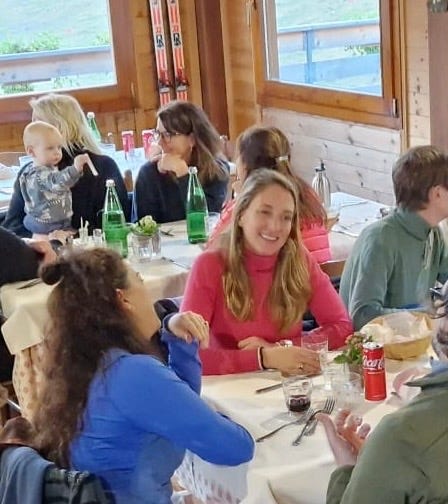
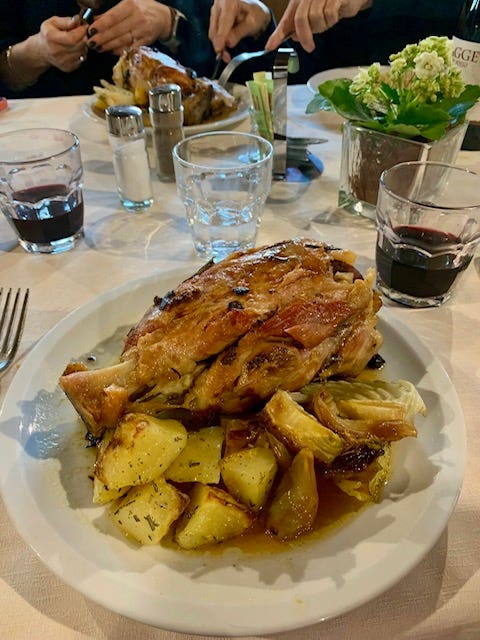
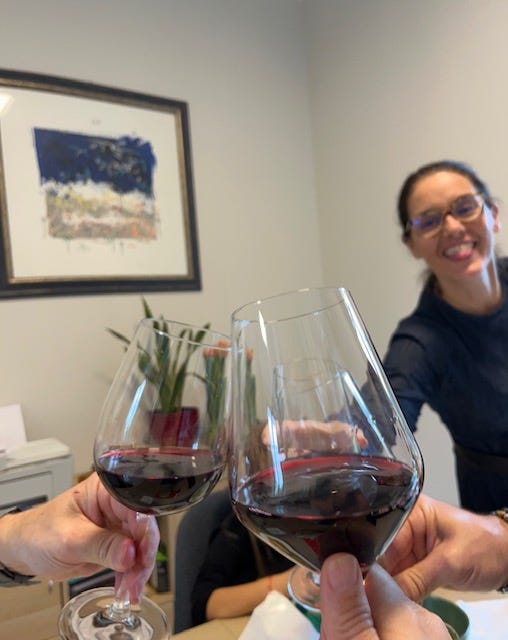
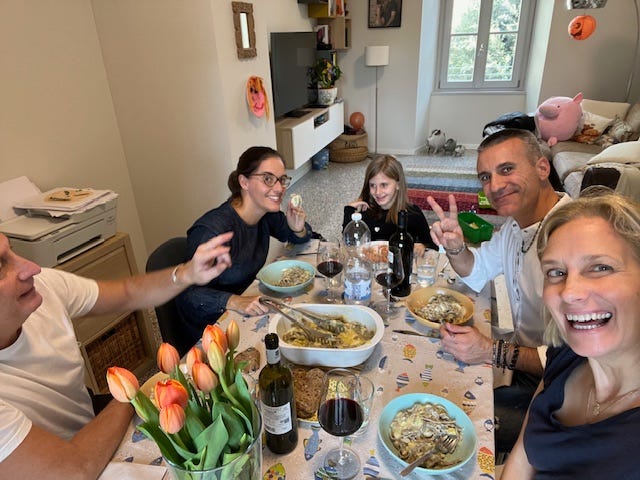
You may have heard Lidia Bastianich close her multitude of cooking tutorials with her tagline: “tutti a tavola a mangiare!” Whether you speak Italian or not, you see Lidia has finished making an Italian delicacy, quite possibly from the Friuli-Venezia region, and it’s time to sit down and eat. You’d be right. Translated into the English, the phrase means “everyone to the table to eat”. At home, I typically say and hear other Italians at home saying: “A tavola!” It means the same thing in just 2 words.
I recently asked this question to my Italian son, Matteo, and partner, Giorgio: “Tavolo vs. Tavola. What do they mean to you? What’s the difference? GO!”
Living in Italy for 14 years, of course I have my own experiences with tavolo and tavola, but I was curious to hear how my loved ones who were born and raised in here in Italy would respond.
Matteo, 13 years old: “tavolo is a table, tavola is EATING.”
My partner, Giorgio: “La tavola è una qualcosa di già definito nel immaginario - le persone che mangiano e bevono e condividano alla tavola, l’atto sociale. Quando si dice ‘a tavola!’ è sottointeso tutto; si capisce cosa deve venire a fare.”
“Il tavolo is the furniture. La tavola is something already defined in the imagination - the people who eat and drink and share around the table, the social act. Everything is inferred in that one word; you know what you are here to do.”
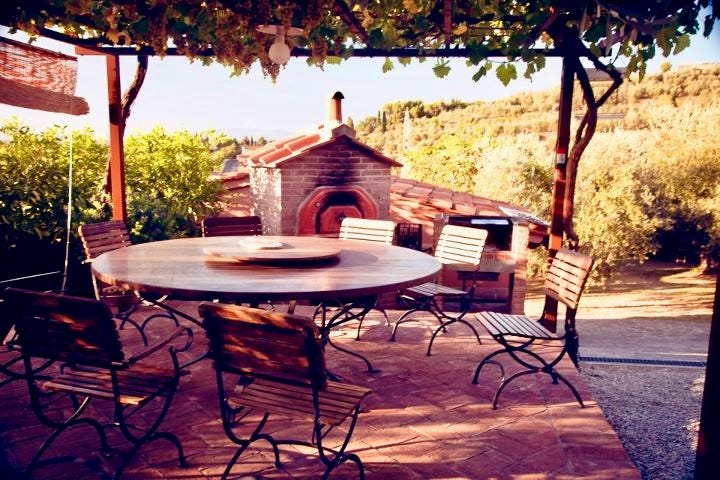
Of course, this concept and these moments of “tavola” also exist in the United States - at the Thanksgiving and Christmas meals for example - it just can’t be explained in one crisp word. The ritual and respect for American holiday meals are the embodiment of something that happens all the time in Italy, so there’s an everyday word for it.
Flipping it around to the English language POV, there are many brilliantly compact words for work activities that simply don’t exist in Italian. English is the language of business and has wonderfully accurate vocabulary. So rather than creating Italian words, the already-existing English words are put to good use. Italians leverage these succinct English work terms even when speaking Italiano, e.g. ‘briefing’, ‘smartworking’, ‘ASAP’, ‘brainstorming’, ‘feedback, and ‘workshop’.
It would take many words in Italian to explain the concept of a ‘briefing’, for example, which in English is one succinct word. Just as in English, it would take many words to explain the concept of ‘tavola’.
This is a popular kids song about “la tavola” raccconting the feeling of anticipation, smells from the kitchen, and preparation as it gets close to lunchtime. The chorus translated: “Let’s all eat together! At the table we love each other a little bit more.” I included the full lyrics at the bottom of the post if you want to practice your Italian.
In summary, a tavola could be at home, at the nonni’s house, at the vacation rental with friends, or at an osteria or trattoria or ristorante. It’s a concept and a feeling and a tradition as well as the physical act of eating. It’s knowing that food is so much more than just nutrition but also family identity, regional provenance, and a “legame” or bond between people and family. The “tavola” is where are these pieces come together and are reinforced on a daily basis; it’s the heart of Italian culture and Italian children are raised to appreciate and participate in this beautiful Italian way of life.
These moments can also happen in the USA, but a culture that normalizes eating alone at a desk while working in front of a computer doesn’t have an inherent respect for the social structure and cultural importance of eating for pleasure and sharing. But lunch ettiquette in an Italian office is a topic for another day!
With that, it’s time for Sunday lunch here on Lake Como, so I’ll wish you ‘buon appetito’ and wonderful day wherever you are! Take it slow and enjoy every minute.
Does the concept of “la tavola” resonate with you? Is it part of your culture or family tradition where you are or where you’re from?❤️
Lyrics to Tutti a Tavola from Zecchino d’Oro:
Quando mezzogiorno si avvicina
Sento come un certo languorino,
E ho voglia di profumi di cucina
Che già me li sognavo stamattina.
Abbiamo voglia di posate e tovaglioli
In fila sulla tavola imbandita,
Il fumo di polenta sui paioli
E soprattutto non mangiare mai da soli!
Mai!
Allora aspetto...
Se serve do una mano!
Il primo, il secondo...
Il contorno prepariamo!
La frutta di stagione...
Ai bambini un dolcino!
Acqua...
Per tutti!
Ai grandi un po' di vino!
Tutti a tavola, a tavola ch' è ora, anzi lo era già da mezz'ora!
E allora che aspettiamo? Mangiamo tutti insieme
Che a tavola ci si vuole un po' più bene!
Tutti a tavola, a tavola ch' è ora, anzi lo era già da mezz'ora!
E allora che aspettiamo? Mangiamo tutti insieme
Che a tavola ci si vuole un po' più bene!
Quando mezzogiorno si avvicina
Sento che borbotta la pancina.
L'odore della pasta fatta in casa,
Il profumo di prosciutto giù in cantina.
Al babbo raccontiamo come va la scuola.
Intanto i nonni arrivano a sorpresa
La mamma dice: "Non andate via"
Perché è più bello mangiare in compagnia!
Tutti!
La pasta ci piace...
Controlliamo la cottura!
E con il secondo
Ci vuole la verdura!
Pane per tutti
Ai grandi un po' di vino!
La frutta...
Sempre!
E ai bambini un dolcino!
Tutti a tavola, a tavola ch' è ora, anzi lo era già da mezz'ora!
E allora che aspettiamo? Mangiamo tutti insieme
Che a tavola ci si vuole un po' più bene!
Tutti a tavola, a tavola ch' è ora, anzi lo era già da mezz'ora!
E allora che aspettiamo? Mangiamo tutti insieme
Che a tavola ci si vuole un po' più bene!
È tutto pronto in tavola! E allora che aspettiamo?
Vogliamoci più bene!
E mangiamo tutti insieme!
Tutti a tavola, a tavola ch' è ora, anzi lo era già da mezz'ora!
E allora che aspettiamo? Mangiamo tutti insieme
Che a tavola ci si vuole un po' più bene!
Italian Schools: 5 Things I Love About Them
Welcome to Raising Bambino! Thank you for reading. Please click the ❤️ if you’re enjoying this and subscribe to receive new articles on bringing up a child in slow life Italy! x Lolly











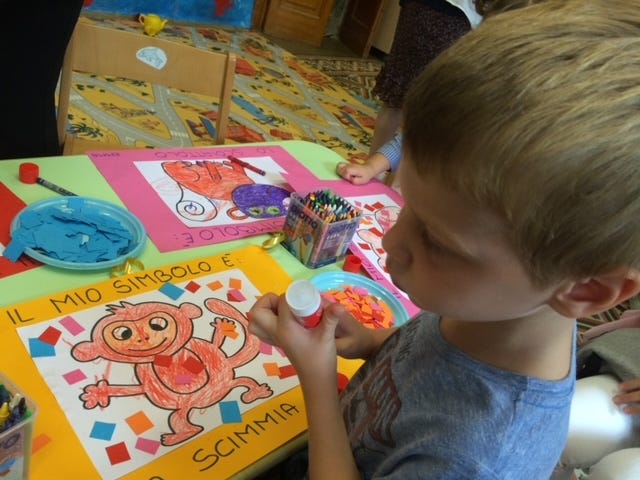
It’s so fascinating that there’s a word that encapsulates a cultural difference that large. It makes me sad that we Americans have so many words for ways of doing business but none that really cover the depth of meaning in “a tavola.” Even as an outsider who has visited Italy only a few times, I can feel the deep significance that Italians attach to this concept of gathering at the table—almost a sacred tradition around food+family+friends. Of course maybe I’m idealizing it, but your pictures and description make it sound so appealing! Thanks for this fascinating piece, Lolly!
At my home we refer to word gather in a similar fashion. We would say let’s gather meaning sit around our table and enjoy the food and friendship.